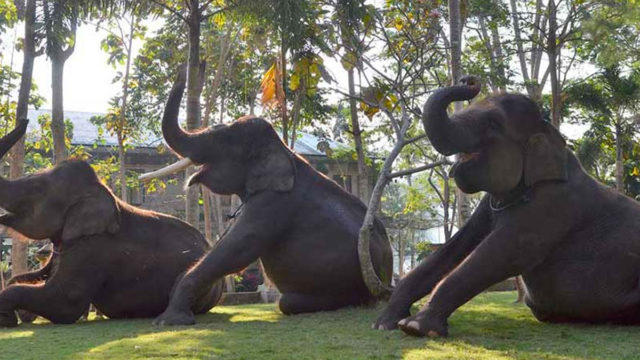Balipost.com reports that Bakas Levi Rafting and Elephant Park is suffering the acute financial effects of having no tourist visitors for more than a year, leaving the Sumatran elephants idle and without their usual activity of entertaining visitors.
To guard the elephants’ health housed at the Bakas Elephant Park, the animal conservators are working hard to provide special attention and care to the Sumatran Elephant. They are resorting to selling assets to ensure the animals receive adequate food and care.
Jro Mangku Alit, the Director of the Bakas Levi Rafting and Elephant Tour in Banjarangkan, Klunkung, confirmed that the elephant park had been closed since March of 2020. 75% of the more of its 100 employees sent home without pay until the pandemic passes.
The workers remaining at the Park are those involved in caring for the animals and their immediate environment. To make financial ends meet, some of the workers have taken part-time and casual labor in the local community when opportunities present.
On Thursday, 08 April 2021, Jro Mangku Alit emphasized that the elephants and animals continue to receive good care. Fortunately, areas surrounding the Park provide cheap or free elephant grass and banana trees that can be used to feed the elephants.
Alit says the elephants continue to survive, even though there are no tourism activities at the moment. He said the Indonesian Association of Zoos is also assisting.
Alit said he Bakas Levi Rafting Elephant Park is home to a remaining seven adult elephants, most of which remain in good health, admitting two of the elephants who have lost a substantial amount of body weight.
He also admitted that more attention needs to be given to his herd of elephants via checks on their general health and blood tests, better food, and the provision of vitamins and supplements so they can become fit again. “We must undertake blood tests. We feed all our elephants the same amount, but why are these two elephants skinny? This needs to get serious attention,” lamented Alit.
Alit said they received no assistance from related Indonesian ministries or local agencies. The only help comes from the Indonesian Association of Zoos.
Jro Mangku Alit said the area used by his Park in the Village of Bakas covers 5 hectares. In addition to a herd of 7 elephants, the Park also has orangutans, monkeys, gibbons, cockatoos, and Eclectus parrots (nurikeets). To feed its animal population, the Park has been compelled to deplete its savings and sell some of its assets.
Alit hopes that the COVID-19 pandemic will soon end, and the tourism situation will return to normal. He also expressed the hope that the Province of Bali will learn the lessons offered by the current and continuing crisis. He said Bali must not become overly reliant on tourism. “In the future, Bali must have an economic sector other than tourism that can become an Island icon. If tourism declines, there will still be another sector upon which to rely,” he said.
In the past, Bakas Levi Rafting and Elephant Tour were one of Klungkung Regency’s leading tourism operators, busiest with foreign tourists during July-August and domestic tourists year’s end.
Jeo Mangku Alit said he remains optimistic that he will continue to conserves the animals and business inherited from his father.
